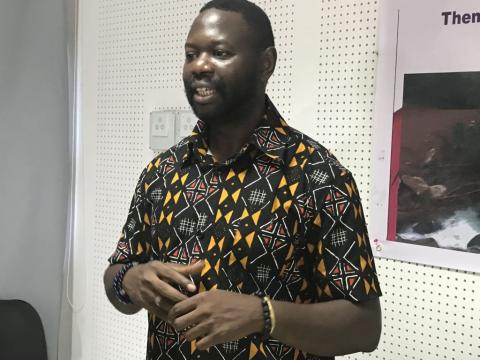By Nasratu Kargbo
The rapid deforestation of hills and the mad rush in replacing the forest with big houses on those slopes, have the high probability for Freetown to experience the collapse of slopes, according to Professor Alhaji Umar N’jai.
The Scientist gave this warning on the 10th October 2023 in a presentation at a climate change conference organized by Green Scenery Sierra Leone.
“We are deforesting our hills at one of the greatest rates in the sub region’’, he said.
Prof. Njai said based on all the recent assessments he has been involved in, landslide tops the chart which means the slopes around Freetown are prone to landslide if triggered by heavy downpour.
“We have already weakened the slopes around Freetown, people have removed the forest cover that holds those hills and built on them”, he explained.
He cited the 2017 mudslide at Sugar Loaf wherein Freetown experienced over two thousand cubic metres of rainfall in three days, which according to the scientist is supposed to be rainfall for three years. He explained that such rain soaks and weakens the soil causing the slopes to collapse, because of the heavy structures built on them.
Prof. Njai warned that “Freetown is a geographical hazard”, an unplanned city that is vulnerable to disaster.
He spoke about human activities around Freetown such as the cutting down of mangroves that serve as barriers against the ocean, slowing down water from going into the land surface.
“When you take out those mangroves there are no brakes, look at Cockle Bay, Aberdeen, Rokel etc. that have become slums”, he noted
He went on to display a picture of excessive sand mining by huge trucks and said where there is less sand would see a rise in sea level which has the tendency to affect the lives of those living in the coastal areas through increased intensity of storm surges, flooding amongst others.
He pointed out that in the event of a heavy downpour, it could lead to water from the hills and the ocean will leave humans endangered in the middle. “It means most of the coastal communities around Freetown will be inundated” he said.
He also mentioned different forms of mining and bush burning for different purposes as contributing factors of climate change,and their negative impact on the environment.
Highlighting some of the drivers to climate change in the Western Area, he mentioned overcrowding and urbanization, saying as a result of rural-urban migration, the city is carrying more than its capacity, which has led to people (mostly the rich) building on the hills and others (mostly poor) deforesting mangroves and building in slums by the sea.
“No good land policy, whilst the Ministry of Environment is talking about environmental policies, the Ministry of Lands is busy selling lands. We are very good at creating policies and ministries, but we do not implement and coordination”, Prof. Njai stated.
Recommending ways to stop such activities, he said there should be collaboration and coordination among ministries to save the environment.
He said there are laws and policies but implementation is the problem. He said naming, shaming and going against the powers that be is the way to solve climate change, citing that those building in the hill tops and buying trucks of sand are mostly the mighty and powerful.
Professor also stated that capacity building should be increased.
There have been growing concerns about the level of degradation taking place especially on the hills of Freetown.
A mudslide at Matormeh close to Regent Village in August 2017 left hundreds of people dead. Hundreds more were reported missing-presumed dead.
Copyright © 2023 Politico (16/10/23)








